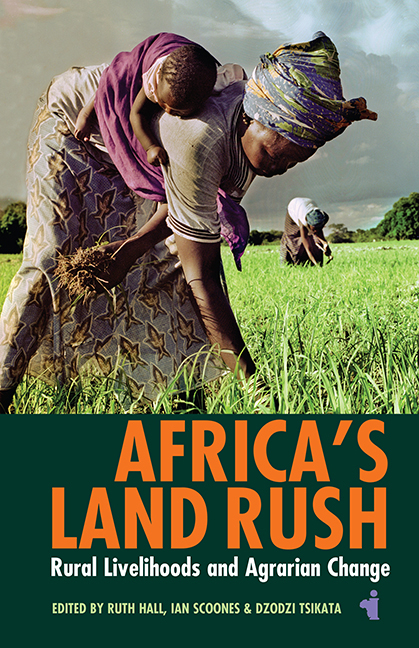Book contents
- Frontmatter
- Contents
- List of Maps, Tables & Figures
- Notes on Contributors
- Preface
- Acknowledgements
- List of Abbreviations
- 1 Introduction: The Contexts & Consequences of Africa’s Land Rush
- 2 State, Land & Agricultural Commercialisation in Kwara State, Nigeria
- 3 Recent Transnational Land Deals & the Local Agrarian Economy in Ghana
- 4 Large-Scale Land Acquisitions in Ethiopia: Implications for Agricultural Transformation & Livelihood Security
- 5 Land Deals & Pastoralist Livelihoods in Laikipia County, Kenya
- 6 Land Deals in the Tana Delta, Kenya
- 7 The State & Foreign Capital in Agricultural Commercialisation: The Case of Tanzania’s Kilombero Sugar Company
- 8 Trapped between the Farm Input Subsidy Programme & the Green Belt Initiative: Malawi’s Contemporary Agrarian Political Economy
- 9 Agrarian Struggles in Mozambique: Insights from Sugarcane Plantations
- 10 South African Commercial Farmers in the Congo
- References
- Index
1 - Introduction: The Contexts &Consequences of Africa’s Land Rush
Published online by Cambridge University Press: 21 May 2021
- Frontmatter
- Contents
- List of Maps, Tables & Figures
- Notes on Contributors
- Preface
- Acknowledgements
- List of Abbreviations
- 1 Introduction: The Contexts & Consequences of Africa’s Land Rush
- 2 State, Land & Agricultural Commercialisation in Kwara State, Nigeria
- 3 Recent Transnational Land Deals & the Local Agrarian Economy in Ghana
- 4 Large-Scale Land Acquisitions in Ethiopia: Implications for Agricultural Transformation & Livelihood Security
- 5 Land Deals & Pastoralist Livelihoods in Laikipia County, Kenya
- 6 Land Deals in the Tana Delta, Kenya
- 7 The State & Foreign Capital in Agricultural Commercialisation: The Case of Tanzania’s Kilombero Sugar Company
- 8 Trapped between the Farm Input Subsidy Programme & the Green Belt Initiative: Malawi’s Contemporary Agrarian Political Economy
- 9 Agrarian Struggles in Mozambique: Insights from Sugarcane Plantations
- 10 South African Commercial Farmers in the Congo
- References
- Index
Summary
Africa is at the centre of a ‘global land grab’. This is what critics have named the rapid growth in land-based investments or land deals since 2007, a phenomenon unmatched since colonial times. By some estimates, 70 per cent of the land transacted in large-scale transnational deals in recent years has been in Africa, often considered the world's last reserve of unused and under-utilised fertile and irrigable farmland (Deininger et al. 2011; World Bank 2009). It is this potential that has lured investors motivated by projections of rising food prices, by growing demand for ‘green’ energy, and by the allure of cheap land and water rights. But governments have often allocated to investors land that is occupied, used, or claimed through custom by local people, resulting in disrupted livelihoods and even conflict.
The case studies presented in this book depict the striking diversity of such deals: white Zimbabwean farmers in northern Nigeria, Dutch and American joint ventures in Ghana, an Indian agricultural company in Ethiopia's hinterland, European investors in Kenya's drylands and a Canadian biofuel company on its coast, South African sugar agribusiness in Tanzania's southern growth corridor, in Malawi's ‘Greenbelt’ and in southern Mozambique, and white South African farmers venturing on to former state farms in Congo. In all cases, acquiring land is intimately linked to gaining access to water: land and water ‘grabbing’ are thus inseparable (Mehta et al. 2012; Woodhouse 2012).
The book explores the investors and their interests, the processes through which these land deals were concluded, and analyses their outcomes for changing agrarian structure, rural livelihoods and food security. Analysis of emerging patterns of social differentiation focuses attention on who wins, who loses out, and what new dynamics of accumulation and marginalisation result, both within directly affected communities and the broader society. The case studies also investigate the political and policy narratives through which these deals are justified and understood, the contested views of land and property that underpin them, and the degree to which new agrarian struggles are emerging in response.
- Type
- Chapter
- Information
- Africa's Land RushRural Livelihoods and Agrarian Change, pp. 1 - 29Publisher: Boydell & BrewerPrint publication year: 2015
- 5
- Cited by



